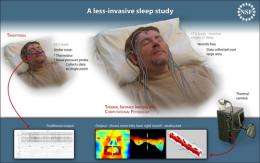The impact of sleep deprivation in children

We all know kids, especially, need a good night's sleep in order to thrive. After studying thousands of children, psychologist Mona El-Sheikh, a professor of child development, says children who don't get enough shut-eye suffer serious consequences.
"They do not concentrate as well or perform well on tasks that are complex," she explains. "Even worse, they may be more likely to be depressed, sick or obese. Sleep is very important for brain development and also for emotional regulation."
As it turns out, what sleep gives, and what the lack of it takes away, may be magnified by poverty. "Poverty is a very, very major stressor for our children," says El-Sheikh.
With support from the National Science Foundation (NSF), El-Sheikh and her team at Auburn University are studying sleep deprivation and how it impacts kids, including those who are otherwise deprived. One week before a child comes to the lab for tests, he or she is asked to wear an actigraph to bed for seven nights. The actigraph straps onto the wrist like a watch and monitors the child's movements during the night. It also reveals how many hours of sleep the child gets each night.
On average, El-Sheikh says the children studied get about seven and a half hours of sleep. Experts say children ages five to 10 need approximately 10 to 11 hours of sleep a night.

Once their sleep is assessed, children who have volunteered for the study go through a battery of tests at El-Sheikh's lab. Team members attach leads to the kids' bodies to monitor how they react to stress--whether it's a faster heart beat or sweaty palms. Then the researchers ratchet up the stress.
Children listen to two people having an argument. They are given a time deadline to perform a series of exercises. They're asked to figure out a Rubik's cube, and trace a star while looking in a mirror--a lot more difficult than it sounds. El-Sheikh says the findings are clear. Sleep matters more for kids, and those who are poor need it most.
"Children, especially those who live in poor neighborhoods and come from more economically disadvantaged homes tend, to benefit more when they sleep better and tend to suffer more when their sleep is poor," she says.
El-Sheikh is not sure why. She thinks it may be a combination of all the stress factors in the children's lives. The good news is, if poor kids get enough rest, that seems to level the playing field.
"They do not get sick as frequently, they're less aggressive, they don't show as much depression and anxiety in the home, and they do much better at school."
So, even parents who are struggling can give their kids a big boost by sending them to bed early. It's an idea worth sleeping on.















